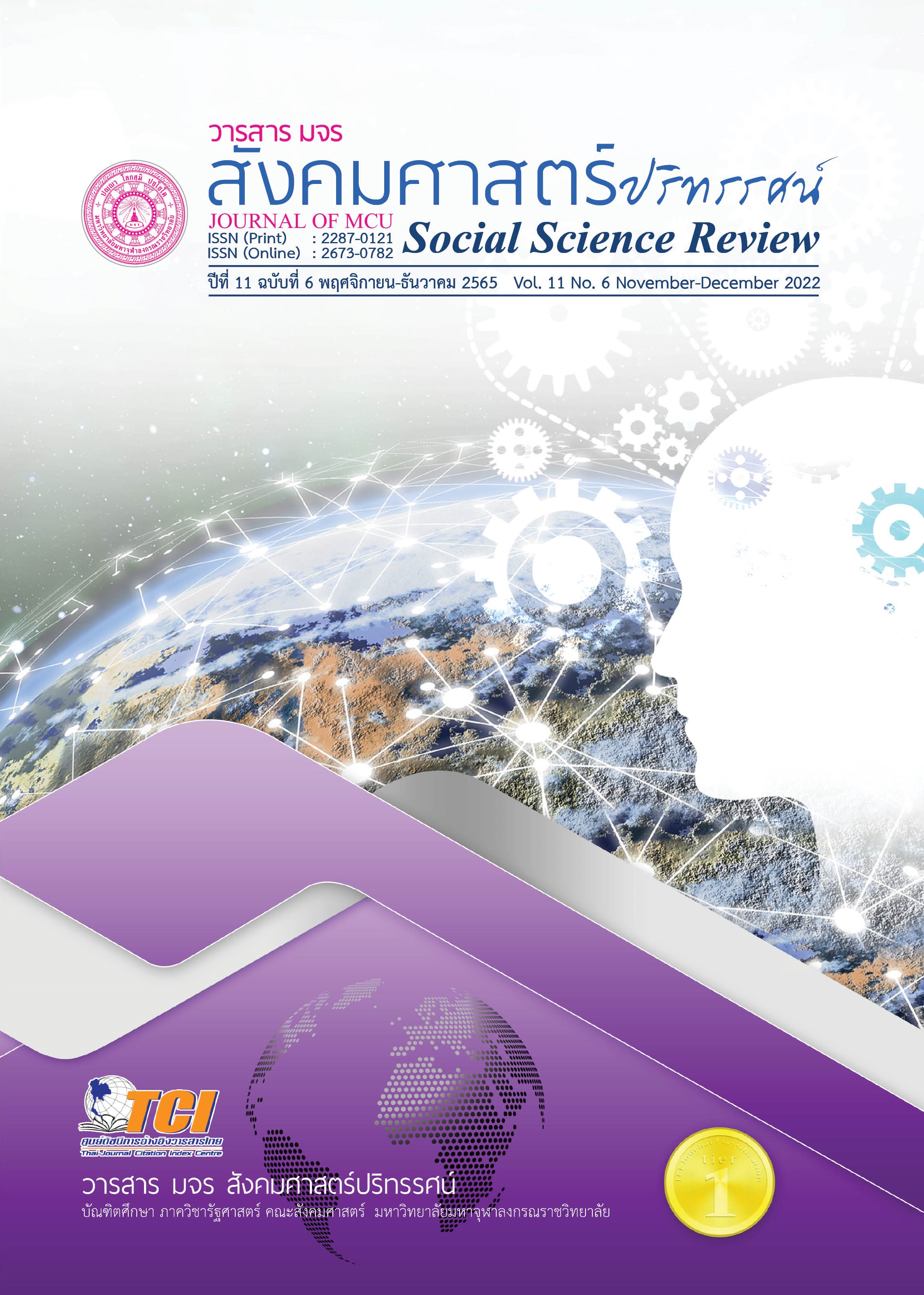การวิเคราะห์ความเข้าใจทางคณิตศาสตร์ของนักเรียนผ่านการแสดงแทน ในลำดับกิจกรรมการสอนการแก้สถานการณ์ปัญหาปลายเปิด
คำสำคัญ:
ความเข้าใจทางคณิตศาสตร์, การแสดงแทนในลำดับกิจกรรมการสอน, สถานการณ์ปัญหาปลายเปิดบทคัดย่อ
บทความวิจัยนี้มีวัตถุประสงค์เพื่อวิเคราะห์ความเข้าใจทางคณิตศาสตร์ของนักเรียนผ่านการแสดงแทนในลำดับกิจกรรมการสอนการแก้สถานการณ์ปัญหาปลายเปิด ในชั้นเรียนที่สอนด้วยวิธีการแบบเปิด กลุ่มเป้าหมายคือนักเรียนชั้นประถมศึกษาปีที่ 2 โรงเรียนไทยรัฐวิทยา 84 (บ้านสำราญเพี้ยฟาน) เครื่องมือวิจัยได้แก่แผนการจัดการเรียนรู้จำนวน 9 แผน แบบบันทึกภาคสนาม วิเคราะห์ข้อมูลตามกรอบการแสดงแทนในลำดับกิจกรรมการสอนของไมตรี อินทร์ประสิทธิ์ (2559) โดยนำแนวคิดของนักเรียนในชั้นเรียนที่ใช้วิธีการแบบเปิด (Open Approach) ของ Inprasitha (2010, 2011) ร่วมกับข้อมูลภาพ เสียง และแบบบันทึกภาคสนามในรูปแบบการบรรยายเชิงวิเคราะห์
ผลการวิจัยพบว่า นักเรียนสามารถแสดงแนวคิดเกี่ยวกับความเป็นรูปธรรมเพื่อนำเสนอ และสื่อความหมายเข้าใกล้ความเป็นนามธรรมได้อย่างต่อเนื่อง คือ 1.การแสดงแทนโลกจริง นักเรียนใช้ภาพ ท่าทาง และภาษาถิ่นเพื่ออธิบายแทนแนวคิดในชีวิตประจำวันซึ่งสอดคล้องกับสถานการณ์ปัญหา 2.สื่อกึ่งรูปธรรม นักเรียนใช้บล็อกไม้ ตารางจำนวน จุดบนลูกเต๋า แปลงดอกไม้ อธิบายแนวคิดความเข้าใจสถานการณ์ปัญหาและแก้ปัญหาด้วยตนเอง ก่อนนำไปสู่สิ่งที่เป็นคณิตศาสตร์ 3.การแสดงแทนโลกคณิตศาสตร์ นักเรียนใช้ตัวเลข สัญลักษณ์ทางคณิตศาสตร์อธิบายแนวคิดที่สื่อความหมายทางคณิตศาสตร์เช่นใช้ตัวเลขแสดงแทนจำนวนของวัตถุ การสร้างแผนภูมิ ซึ่งนักเรียนสามารถอธิบาย อภิปรายหาข้อสรุปร่วมกัน เริ่มจากนำสิ่งต่าง ๆ แปลเป็นสิ่งที่เป็นกึ่งรูปธรรม และเชื่อมโยงเป็นสัญลักษณ์ประโยคทางคณิตศาสตร์
เอกสารอ้างอิง
เจนสมุทร แสงพันธ์. (2560). จากโลกกายภาพสู่โลกสัญลักษณ์ : กระบวนการเรียนรู้เรื่องการบวกของนักเรียนชั้นประถมศึกษาปีที่ 1 ในชั้นเรียนที่สอนด้วยวิธีการแบบเปิด. ศึกษาศาสตร์สาร. มหาวิทยาลัยเชียงใหม่, 1(1), 53-67.
ไมตรี อินทร์ประสิทธิ์ และคณะ. (2546). การปฏิรูปกระบวนการเรียนรู้ คณิตศาสตร์ในโรงเรียนโดยเน้นกระบวนการทางคณิตศาสตร์. ขอนแก่น: ขอนแก่นการพิมพ์
ไมตรี อินทร์ประสิทธิ์. (2557). กระบวนการแก้ปัญหาในคณิตศาสตร์ระดับโรงเรียน. ขอนแก่น: ศูนย์วิจัยคณิตศาสตรศึกษา.
______. (2559). เอกสารประกอบการบรรยายในกิจกรรมอบรมเชิงปฏิบัติการสำหรับบุคลากรในโรงเรียนโครงการพัฒนาการคิดขั้นสูงทางคณิตศาสตร์ของนักเรียนในเขตพื้นที่ภาคตะวันออกเฉียงเหนือวันที่ 28 ตุลาคม 2559. ขอนแก่น: ศูนย์วิจัยคณิตศาสตรศึกษา; 2559
______. (ผู้บรรยาย). (2562). การเสนอเค้าโครงวิทยานิพนธ์วันที่ 24 พฤศจิกายน 2562. [เทปบันทึกเสียง]. ขอนแก่น: สถาบันวิจัยและพัฒนาวิชาชีพครูสำหรับอาเซียน มหาวิทยาลัยขอนแก่น
วจีมาศ ชัยพฤกษทล. (2561). การแสดงแทนในลำดับกิจกรรมการสอนในชั้นเรียนที่ใช้การศึกษาชั้นเรียนและวิธีการแบบเปิด (วิทยานิพนธ์ปริญญาศึกษาศาสตรมหาบัณฑิต สาขาวิชาคณิตศาสตร์ศึกษา) ขอนแก่น: มหาวิทยาลัยขอนแก่น.
Duval, R. (2002). A Cognitive Analysis of Problems of Comprehension in a Learning of Mathematics. Educational Studies in Mathematics, 61(1), 103 – 131.
Inprasitha, M. (2010). One Feature of Adaptive Lesson Study in Thailand: Designing a Learning Unit. Proceeding of the 45th National Meeting of Mathematics Education.
______. (2011). One Feature of Adaptive Lesson Study in Thailand: Designing a Learning Unit. Journal of Science and Mathematics Education in Southeeast Asia, 34(1), 47-66
Nohda, N. (2000). Teaching by Open-Approach Method in Japanese Mathematics Classroom. Proceeding of the 24th Conference of the International Group for the Psychology of Mathematics Education (PME 24), Hiroshima, Japan: Hiroshima University.
Tsuji, H. (2007). What kind of Teaching Materials and Aid are Used in Japan? Japanese Lesson Study in Mathematics: Its Impact, Diversity and Potential for Educational Improvement. Japanese: World Scientific Publishing Co. Pte.
ดาวน์โหลด
เผยแพร่แล้ว
รูปแบบการอ้างอิง
ฉบับ
ประเภทบทความ
สัญญาอนุญาต
ลิขสิทธิ์ (c) 2022 วารสาร มจร สังคมศาสตร์ปริทรรศน์

อนุญาตภายใต้เงื่อนไข Creative Commons Attribution-NonCommercial-NoDerivatives 4.0 International License.
เพื่อให้เป็นไปตามกฎหมายลิขสิทธิ์ ผู้นิพนธ์ทุกท่านต้องลงลายมือชื่อในแบบฟอร์มใบมอบลิขสิทธิ์บทความให้แก่วารสารฯ พร้อมกับบทความต้นฉบับที่ได้แก้ไขครั้งสุดท้าย นอกจากนี้ ผู้นิพนธ์ทุกท่านต้องยืนยันว่าบทความต้นฉบับที่ส่งมาตีพิมพ์นั้น ได้ส่งมาตีพิมพ์เฉพาะในวารสาร มจร สังคมศาสตร์ปริทรรศน์ เพียงแห่งเดียวเท่านั้น หากมีการใช้ภาพหรือตารางหรือเนื้อหาอื่นๆ ของผู้นิพนธ์อื่นที่ปรากฏในสิ่งตีพิมพ์อื่นมาแล้ว ผู้นิพนธ์ต้องขออนุญาตเจ้าของลิขสิทธิ์ก่อน พร้อมทั้งแสดงหนังสือที่ได้รับการยินยอมต่อบรรณาธิการ ก่อนที่บทความจะได้รับการตีพิมพ์ หากไม่เป็นไปตามข้อกำหนดเบื้องต้น ทางวารสารจะถอดบทความของท่านออกโดยไม่มีข้อยกเว้นใดๆ ทั้งสิ้น





